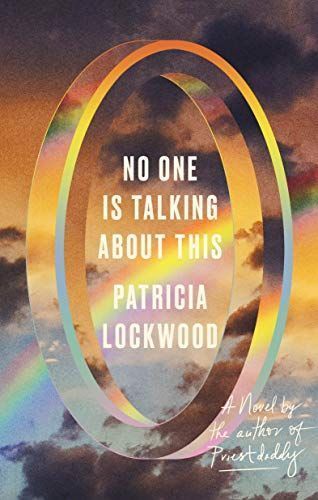
No One Is Talking About This A Novel
"I really admire and love this book. Patricia Lockwood is a completely singular talent and this is her best, funniest, weirdest, most affecting work yet." --Sally Rooney "A furiously original novel." --Jia Tolentino From "a formidably gifted writer" (The New York Times Book Review), a book that asks: Is there life after the internet? As this urgent, genre-defying book opens, a woman who has recently been elevated to prominence for her social media posts travels around the world to meet her adoring fans. She is overwhelmed by navigating the new language and etiquette of what she terms "the portal," where she grapples with an unshakable conviction that a vast chorus of voices is now dictating her thoughts. When existential threats--from climate change and economic precariousness to the rise of an unnamed dictator and an epidemic of loneliness--begin to loom, she posts her way deeper into the portal's void. An avalanche of images, details, and references accumulate to form a landscape that is post-sense, post-irony, post-everything. "Are we in hell?" the people of the portal ask themselves. "Are we all just going to keep doing this until we die?" Suddenly, two texts from her mother pierce the fray: "Something has gone wrong," and "How soon can you get here?" As real life and its stakes collide with the increasingly absurd antics of the portal, the woman confronts a world that seems to contain both an abundance of proof that there is goodness, empathy, and justice in the universe, and a deluge of evidence to the contrary. Fragmentary and omniscient, incisive and sincere, No One Is Talking About This is at once a love letter to the endless scroll and a profound, modern meditation on love, language, and human connection from a singular voice in American literature.
Reviews
Saffia@saffia
Patrick Book@patrickb
Bria@ladspter
nen@petitfleurdumal
John Manoogian III@jm3
Lindy@lindyb
Cody Degen@codydegen
Ashlyn@demonxore
Cristian Garcia@cristian
Midori Kobayashi@snortingpages
Shona Tiger@shonatiger
Ben Jenkins@benjenkins
Maria Otero@mer
Wonko the Sane@wonko
Jayme Bosio@jaymeb
Lilly@lillyybeck
Charlotte @readwithchar
Katie Chua@kchua
toch@defend
Marion@mariorugu
Fraser Simons@frasersimons
Angbeen Abbas@angbeen
aem@anaees
Josh Clement@joshclement
Highlights
N@smaragdinemondegreen
Page 134
N@smaragdinemondegreen
Page 131
N@smaragdinemondegreen
Page 117
N@smaragdinemondegreen
Page 96
N@smaragdinemondegreen
Page 90
N@smaragdinemondegreen
Page 85
N@smaragdinemondegreen
Page 85
N@smaragdinemondegreen
Page 81
N@smaragdinemondegreen
Page 77
N@smaragdinemondegreen
Page 66
N@smaragdinemondegreen
Page 63
N@smaragdinemondegreen
Page 60
N@smaragdinemondegreen
Page 57
N@smaragdinemondegreen
Page 56
N@smaragdinemondegreen
Page 56
N@smaragdinemondegreen
Page 55
N@smaragdinemondegreen
Page 53
N@smaragdinemondegreen
Page 48
N@smaragdinemondegreen
Page 40
Katherine@katebugs
Katherine@katebugs
Katherine@katebugs
Katherine@katebugs
Katherine@katebugs